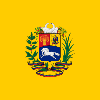Bolivarian Revolution
 |
|---|
|
|
The “Bolivarian Revolution” refers to a leftist social movement and political process in Venezuela led by Venezuelan president Hugo Chávez, the founder of the Fifth Republic Movement (replaced by the United Socialist Party of Venezuela in 2007). The "Bolivarian Revolution" is named after Simón Bolívar, an early 19th century Venezuelan and Latin American revolutionary leader, prominent in the Spanish American wars of independence in achieving the independence of most of northern Latin America from Spanish rule. According to Chávez and other supporters, the "Bolivarian Revolution" seeks to build a mass movement to implement Bolivarianism - popular democracy, economic independence, equitable distribution of revenues, and an end to political corruption - in Venezuela. They interpret Bolívar's ideas from a socialist perspective.
Background: Bolivarianism
Simón Bolívar has cast a long shadow over Venezuela's history. Tamarick Person noted "a spontaneous and enduring popular cult of Bolivar" as early as 1842, and he is venerated in "parades, speeches, ceremonies, competitions, inaugurations, commemorations, unveilings of monuments, official publications, and other formal events".[citation needed]
Chavez as a military cadet was "a celebrant of the Bolivarian passion story".[1] Chávez relied upon the ideas of Bolívar, and on Bolívar as a popular symbol, later in his military career as he put together his MBR-200 movement which would become a vehicle for his 1992 coup-attempt.
Policies
| Missions of the Bolivarian Revolution of Venezuela |
|---|
| Food, Housing & Medicine |
| Education |
| Indigenous Rights, Land & Environment |
| Leaders |
The Chávez administration has deployed national social welfare programs (Misiones or "Missions") called Bolivarian Missions.
Internationalism
The "Bolivarian Revolution" under Chávez has also refocused Venezuelan foreign policy on Latin American economic and social integration by enacting bilateral trade and reciprocal aid agreements, including his so-called "oil diplomacy", which provides cheap oil to poor neighbouring nations. Chávez regularly portrays his movement's objectives as being in intractable conflict with neocolonialism and neoliberalism.
See also
References
- ^ Enrique Krauze, "The Shah of Venezuela", The New Republic, 1 April 2009
External links
- Schuyler, George W. (The Policy Studies Organization) Health and Neoliberalism: Venezuela and Cuba. Retrieved 18 Oct 2005.
- Template:Es icon Gobierno en Línea: Misiones — Official government website detailing the Bolivarian Missions.
- Richard Gott, The Guardian, 30 May 2005, Chávez leads the way
- Christian Parenti, The Nation, 11 April 2005, "Hugo Chávez and Petro Populism"
- Template:Es icon Gobierno en Línea: Misiones — Official government website detailing the Bolivarian Missions.
- Template:Es icon Misión Barrio Adentro — Official government Mission Barrio Adentro web portal.
- Template:Es icon Instituto Nacional de Estadística — Venezuela's National Institute of Statistics; has web several portals for accessing demographic and economic data related to the impact of Bolivarian Missions.
- Template:Es icon Barrio Adentro — Official government dossier on Barrio Adentro (in Spanish)
- Template:Es icon Aló Presidente 225 — Video of a July 2005 episode of Hugo Chávez's talkshow Aló Presidente that features an eight hour tour of a new Barrio Adentro II CDI (Centros de Diagnóstico Integral) in Maturín, Monagas state, Venezuela.
- Template:Es icon Programa Nro. 225 - Aló Presidente — Transcript of Aló Presidente 225.
- Venezuela's Cooperative Revolution from Dollars & Sense magazine
- Exploring the Dialectic of the Bolivarian Revolution by Monthly Review
- Gott, Richard. The Guardian, 25 Aug 2005. Two fingers to America.
- Wilpert, Gregory. Venezuelanalysis, 11 Nov 2003. "Venezuela’s Missions to Fight Poverty".
- Jorge Martin, "While Bush prevaricates, Venezuela offers help to US poor". In Defense of Marxism. 2 September 2005


